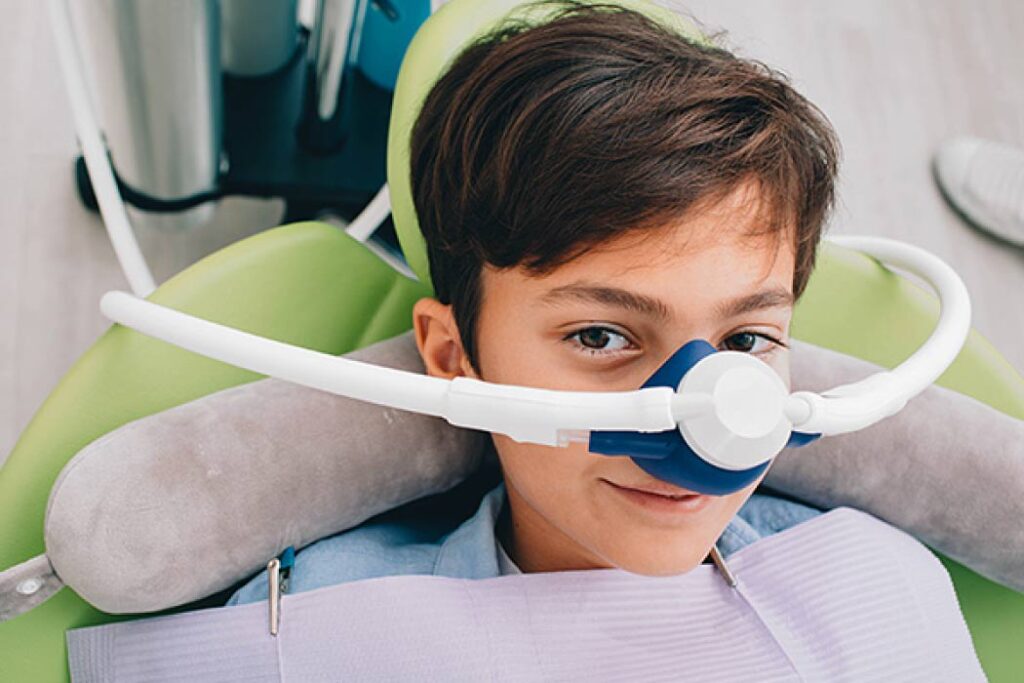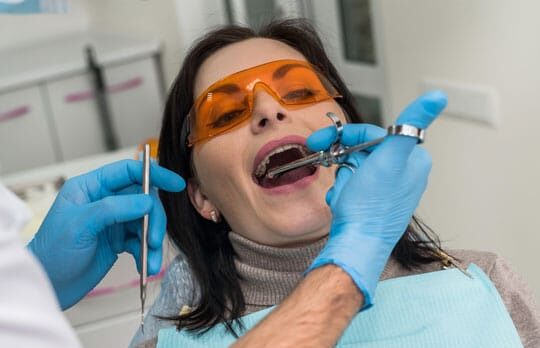
Wisdom teeth, the third and final set of molars to emerge in young adults, are known to cause a variety of oral health problems when they become impacted or misaligned. The wisdom teeth removal surgery have thus become a common yet often dreaded surgical procedure.
In particular, many are fearful of the pain and discomfort during the surgery. The use of sedation techniques such as anesthesia and laughing gas have essentially alleviated any form of pain. However, there has been a longstanding debate over the best method of sedation during the wisdom teeth removal surgery.
In the rest of this article, we will explore the pros and cons of laughing gas and traditional anesthesia, as well as what to expect during the procedure. Whether you are nervous about going under anesthesia or simply curious about your options, this will provide you with the necessary information to make an informed decision about your wisdom teeth removal procedure. So let’s dive in and explore the world of sedation!
What is Laughing Gas?
Laughing gas, also known as nitrous oxide, is a colorless, odorless, and non-flammable gas that has been used in medical and dental procedures as a sedative and analgesic.
The inhaling of laughing gas causes a feeling of euphoria and relaxation and can last anywhere from five to twenty minutes depending on how much was inhaled. It works by inhibiting the transmission of signals in the central nervous system, resulting in reduced pain and anxiety.
Laughing gas is mostly used during dental procedures that are relatively straightforward as well as during medical surgeries when the patient suffers from anxiety. However, the seemingly harmless gas have grown in popularity among young people as a recreational drug. This stems from the false perception that the gas is cheaper and safer to use than most illicit drugs such as cannabis or ecstasy. When abused for its intoxicating effects, laughing gas can lead to serious health risks.
Pros and Cons of Laughing Gas
Laughing gas has been shown to be effective at relieving pain and reducing anxiety during medical procedures. Its rapid onset of action mean that a patient can feel the effects of laughing gas within minutes of inhalation, making it useful for treating dental procedures.
Furthermore, it has a short duration of action and typically wears off 5 to 10 minutes after the supply is turned off. Last but not least, laughing gas is a relatively safe sedation technique when administered by trained professions.
However, abuse or improper administration of the gas can lead to medical complications such as nausea, difficulty walking, slurred speech and a tingling effect in the limbs. In some cases, it can lead to seizures, loss of consciousness and nerve damage. The feeling of euphoria and relaxation can also lead to an addiction, particularly among adolescents and young adults.
Overall, laughing gas can be a useful tool for managing pain and anxiety during medical procedures when used appropriately by trained professionals. However, one must be aware of the potentially addictive effect of the gas as well as the consequences of abusing it.
What is Anesthesia?
Anesthesia is a medical technique that involves the use of drugs to induce a temporary loss of sensation or consciousness in the patient. This allows the medical procedures such as the removal of wisdom teeth to be performed without causing any pain or discomfort as the sensation has been blocked.
There are primarily two different types of anesthesia: general and local anesthesia. The former induces a state of unconsciousness while the latter involves the injection of an anesthetic directly in the area where the medical procedure will be taking place. General anesthesia is typically used for long operations or procedures that are very painful.

The decision to use local anesthesia or general anesthesia depends on the specifics of the procedure and the patient’s individual needs and medical history. As such, general anesthesia is rarely used for wisdom teeth removal as the procedure is relatively easy and straightforward.
It is important to note that anesthesia can only be administered by anesthesiologists. They are specialized medical doctors who are responsible for administering anesthesia and monitoring patients during the surgical procedure to ensure their safety and comfort.
Very often, local anesthesia is complimented by intravenous, or IV, sedation. Similar to laughing gas, IV sedation work to reduce a patient’s anxiety during the procedure. It is sometimes referred to as “twilight sleep” as the patient is awake throughout the wisdom teeth removal surgery but has no memory of it.
Pros and Cons of Anesthesia
Anesthesia is generally preferred when complete pain relief is required during medical procedures. Furthermore, anesthesia reduces pain and stress, allowing the patient to recover more quickly during the surgery. Advancement in modern medicine have made anesthesia techniques safe and effective with little complications.
While anesthesia works well in providing pain relief, there is increased risk of complications when the patients. These can include allergic reactions, breathing difficulties, and heart problems. That said, local anesthesia is less likely to cause complications than general anesthesia.
Patients who are administered general or local anesthesia will also suffer from prolonged effects of anesthesia such as grogginess, fatigue, and nausea; the effect can last for up to 12 hours after the procedure.
Last but not least, anesthesia is an expensive procedure as it involves an anesthesiologist who has to be present throughout the surgical procedure.
Which Is Better?
Laughing gas and anesthesia are two different types of sedatives that can be used for wisdom teeth removal surgeries. Both sedatives have risks and potential side effects, which should be carefully considered before making a decision.
In general, laughing gas is preferred over local anesthesia for wisdom teeth removal as it is a relatively inexpensive and safer technique. However, patients who suffer from dental anxiety or are undergoing a more complicated surgery may find local anesthesia a better option.
Ultimately, there is no better option when comparing laughing gas and anesthesia. The best choice depends on the complexity of the procedure, the patient’s medical conditions, and many other factors that may impact the outcome of the surgery. It is important that you always consult your oral surgeon before making a choice as they will be able to provide recommendations based on your health history and needs.






